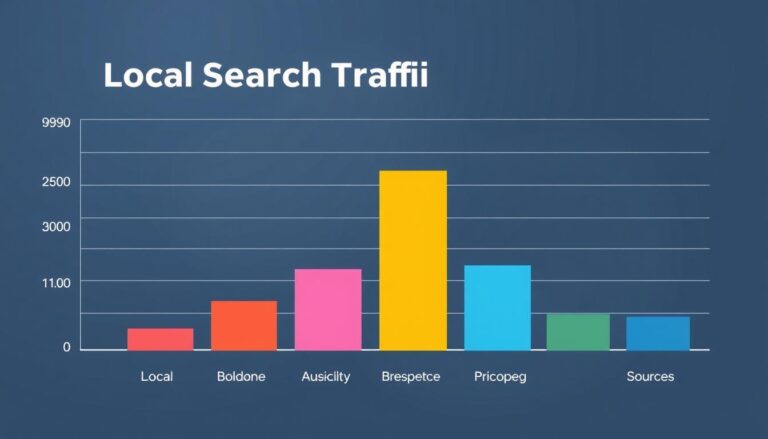Did you know voice search usage jumped 146% in just five years? It went from 3.25 billion users in 2019 to 8 billion in 2023. This big increase shows more people are using voice-activated helpers like Siri, Alexa, and Google Assistant. It’s changing how we use the internet.
Now, 58.6% of Americans have tried voice search at least once. And 21% use it regularly. This means businesses must focus on voice search SEO and local SEO. Making your business easy to find through voice search is a must.
The smart speaker market was worth $6.4 billion in 2023. Experts think it will reach $110 billion in ten years. This growth isn’t just about new gadgets. It’s a chance for local businesses to be seen more online by using voice search.
Understanding this big change is crucial for businesses. Using voice search SEO tips is important. It makes sure businesses show up in voice searches. This attracts customers who like using voice to find things fast.
In summary, voice search is a big chance for local businesses. With smart strategies, voice search can lead to huge success in local SEO. It puts businesses ahead in a tough digital market.
Understanding the Rise of Voice Search
Now, over 50% of internet searches happen through voice. This number is set to increase as more smart devices are used. By 2022, it’s guessed that 55% of U.S. homes will have a smart speaker. Right now, 20% of searches on mobile phones are done by voice.
More than half of people use voice search to find out about local shops and services. And 72% use it every day, making it a vital part of their routine.

There are many reasons why voice search is getting more popular. It’s easier to talk to devices than type. This is especially true for mobile gadgets. Voice-activated devices are also cheap and easy to use. They’re great for quick searches about places, products, and services while you’re out and about.
Voice searches are usually longer and sound more like a chat. They often start with a question. This means websites must offer answers in their content.
- Voice search is spreading to more types of smart gadgets, raising new challenges.
- Combining voice search with online shopping is expected to increase.
- For voice search, security is important. Moving to HTTPS might help your site’s ranking.
- Using structured data can help your site show up better in searches.
As technology gets better, voice search will play a bigger part in our lives. Knowing these trends and how they affect voice search adoption is key for businesses. They need this info to keep up in the digital world.
Voice Search Optimization for Local SEO
Voice search is getting more popular. It is now key to match this trend with local SEO. People use voice search in a natural, conversational way. They look for local businesses or services. Companies must change their methods. They need to match what voice search users want. Here are key tips for optimizing for local SEO.

The Importance of Conversational Queries
Voice searches sound like talking to a friend. Users often ask questions in a natural way. Use long-tail keywords that sound like everyday talk. This can help your site show up in voice search results. For instance, use “Where can I find the best pizza near me?” instead of “best pizza.” Making your content fit conversational searches boosts visibility on voice search devices like Siri, Alexa, and Google Assistant.
Local Intent and “Near Me” Searches
Most voice searches are looking for something local. This makes local SEO very important. Up to 70% of these searches include “near me.” Businesses should share clear info about their location, hours, and how to get in touch. Use local keywords and terms like “near me” to connect with voice search users seeking services close by.
Information-Seeking Queries
People use voice search to find quick answers. They are looking for straightforward responses, like featured snippets. Your content should directly answer common questions. For example, answer “What are your business hours?” or “How do I contact customer service?” This meets the quick needs of voice search users and raises your chances of being chosen by virtual assistants.
Strategies to Optimize for Voice Search
To get ahead in voice search, you must use smart strategies. Voice searches often look for quick, local info. So, businesses should focus on certain techniques to be seen more online and attract customers.

Claim and Optimize Google My Business
Optimizing Google My Business is key for voice search. Make sure your listing is claimed and all details are right. This means your address, phone number, and when you’re open need to be clear. Also, post good photos.
Having happy customer reviews is also important. They make your business seem more trustworthy and can boost your voice search rankings.
Target Longtail Keywords
Voice searches are usually like talking and focus on longtail keywords. These are longer phrases that are not as common. They help your business show up better in search results. Use natural phrases in your content to improve your chances in voice searches.
Implement Structured Data and Schema Markup
Structured data and schema markup are vital for voice searches. They help search engines understand your site better. This makes your content more likely to show up in voice searches.
By using schema markup, you give detailed info about your business. Things like your location, what you do, and your hours. This detailed info helps voice assistants give better answers. This improves your chances to be found in voice searches.
Voice Search Mobile-Friendliness and Speed
Voice search is getting more popular. In fact, by the end of 2024, it’s expected to be half of all searches. This makes having a mobile-friendly website very important. Most voice searches happen on mobile devices. So, you need a site that works well on them.
Making your website mobile-friendly means it should work well on any screen size. You need an easy-to-use navigation and local search options. This helps meet the needs of mobile users.

Fast loading times are key for keeping visitors and doing well on search engine rankings. Voice search users want quick responses. This makes your site’s loading speed really important. Here are some things your site needs:
- Streamlined and intuitive navigation
- Quick loading times to meet user expectations
- Clickable call-to-action buttons like click-to-call options
- Simple booking functionality for services
- High-quality, conversational content that caters to natural speech patterns
People using voice search mainly do so on mobile devices. They want fast and right answers. Making sure your website loads quickly and is mobile-friendly is key. It helps improve the experience for users. It also reaches more people using voice search.
Building Reviews and Citations for Local SEO
In today’s competitive digital landscape, building online reviews and establishing local business citations are key. They boost local SEO, especially with voice search.

About 46% of Google searches are local. And 29% of Google’s search results show a local pack. This shows how critical it is to improve your local presence.
- Encourage customers to leave positive reviews on platforms like Google, Yelp, and TripAdvisor.
- Respond promptly to reviews. This shows you value customer feedback. It can boost trust and engagement.
The importance of local business citations is huge. They’re major factors in search rankings:
- Having consistent Name, Address, Phone number (NAP) across all citations is vital. It improves local search rankings.
- High-quality citations from respected sources like local news outlets boost your visibility.
- Regular citation checks keep your business info accurate across the web.
Being part of community events and partnering with local businesses offer natural citation chances. These actions make your business a trusted local name. This, in turn, betters your local SEO.
Using reliable data aggregators helps get your business info into online directories. Getting citations from industry-specific directories is important too. Since 76% of people looking for local stuff on their phones visit a store the same day, strong local SEO matters a lot.
Conclusion
Voice search is changing how users search and how local businesses have to think about SEO. It’s vital for the success of local businesses to keep up with the growth of voice search. This growth is shown by a projection from Statista on the rise of digital voice assistant users.
Voice searches are more like talking to a friend. They often use longer phrases. BrightLocal says 58% of people find local business info this way. So, businesses should include “near me” in their SEO to show up in these searches.
To get ahead in voice search, there are key steps to take.
- Make sure your Google My Business listing is up to date.
- Use long-tail keywords that people naturally speak.
- Add structured data to your site. This helps you stand out in search results.
Voice searches mostly happen on phones. This means your site must be mobile-friendly and load fast. Keep an eye on your voice search performance. Always look for ways to get better. This will help your business grow its online presence.
Leverage Voice Commerce and AI for Local SEO
Voice commerce is growing fast, giving businesses new local SEO chances. By 2024, over half of web searches will be voice-based. This highlights voice commerce’s role in digital marketing today. It makes buying easier and fits how consumers now act.
AI helps by making these voice interactions better. It looks at search trends to improve SEO results. Voice-activated tools powered by AI are changing the game.
AI spots key phrases used in voice searches. These often sound more casual and may include “near me.” AI lets businesses match their content to how people talk. It also checks if websites are fast and mobile-friendly for voice searches.
To get more from voice commerce, use speakable schema markup. Connect with Amazon Alexa, Google Home, and Siri. Adding structured data like FAQPage and LocalBusiness boosts your search visibility. AI analyses user behavior, helping refine your marketing.
Adding AI and voice search to SEO is a must. It keeps your business ahead as tech grows. This blend is key to a strong online presence.




